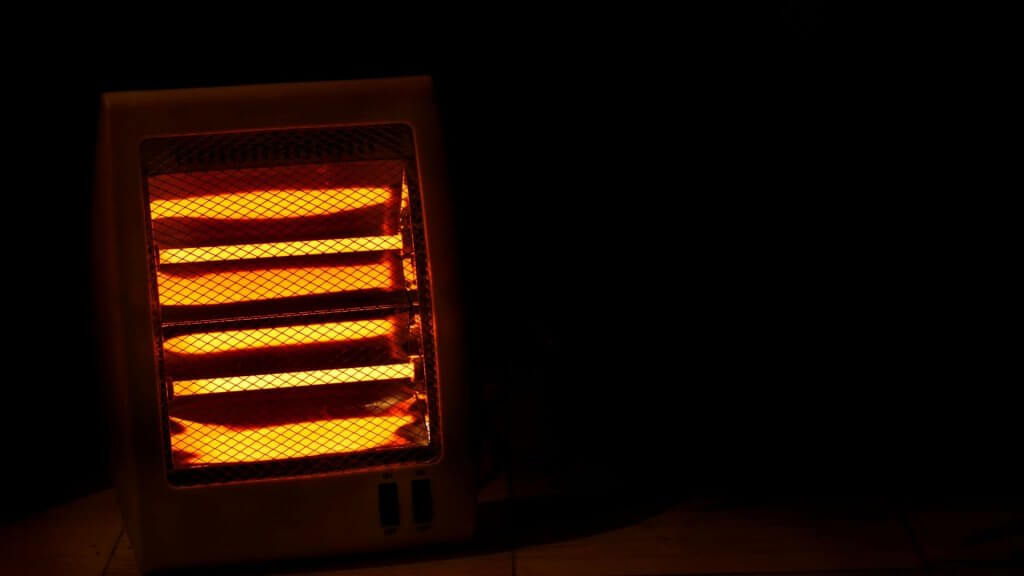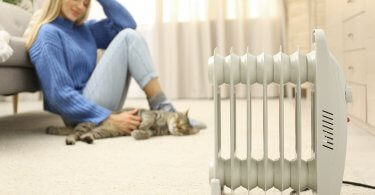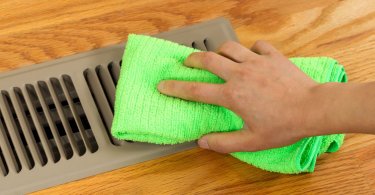Not everyone has a central heating system. Sometimes, you may want to save some money by turning your central heating off to avoid heating empty rooms.
In any of these scenarios, a space heater is your ideal solution. When the winter season is at its peak, there is nothing more tempting than sleeping with your space heater on at night.
Although space heaters have come a long way and are safer than before, running one all night without supervision is still not a good idea. Read below to understand the risks of running space heaters overnight and the best practices to use a space heater safely.

Can You Leave An Electric Heater On All Night?
Even though a modern space heater has safety features that allow you to run them for a longer duration without supervision, considering the safety of you and your family, the answer would be no. You can not leave an electric heater on all night to avoid any fire risks.
According to a report from the National Fire Protection Association, heating is the third leading cause of home fire deaths and the second leading cause of home fire injuries and US home fires.
Also, space heaters are responsible for more than two out of every five home fires. The peak winter season months, which are December, January, and February, are also the peak months for home fires related to heating.
More than half of the space heater-related home fires started due to the heater being near any object, which ignited and resulted in a fire. Also, if someone has an older space heater, it won’t have the auto shut-off feature and can result in a fire if the unit falls.
Running space heaters for too long can also result in overheating of the wires. If you leave an electric heater on all night and it starts a fire when you are asleep, you may not wake up in time to escape.
Best Practices for Using Space Heaters Safely
Modern-day space heaters have come a long way from their older counterparts, but there are still chances of accidents.
About 20 percent of home fires happen from 8:00 pm to midnight, and 18 percent occur between midnight to 8:00 am. The statistics are scary, but most of these fires are preventable if you follow the best practices for safely using space heaters.
Smoke Alarms
Install fully functioning smoke detectors throughout your house. Smoke detectors sense the smoke, and if there is a considerable amount of smoke, they go off.
They are essential in alerting you of any fire in your home by continuing to play a loud alert sound until you turn the alarm switch off. A fully functioning smoke detector can save you and your family’s life in case of a real fire.
Routinely check the smoke detectors and test them every once in a while. If you hear a low beep or the lights are blinking, replace the batteries on the smoke detectors.
Apart from smoke detectors, carbon monoxide detectors are also crucial for homes if there is a fireplace or non-electric heaters.
Related article: Best CO2 Sensors – Buyers’ Guide & Reviews
Carbon monoxide poisoning is lethal and undetectable by the naked eye. Like the smoke detectors, you need to check your carbon monoxide detectors routinely. There are models you can choose which have both smoke and carbon monoxide detectors.
Do Not Overload the Circuits
An electric space heater, on average, consumes 1,500 watts of power when you operate them at its maximum settings. Make sure not to run multiple electrical appliances simultaneously, as that can result in overheating the electric circuit.
Also, always plug the space heater directly into the wall outlet and never into an extension board, as that increases the fire risk. An extension board can handle low-wattage appliances just fine, but operating a high-wattage heater will result in overheating.
Another crucial thing is always to use three-prong-grounded outlets. Outdated two-prong outlets don’t ground the electricity and can be a fire safety risk.
Related article: My Electric Heater Turns On and Off Repeatedly [Fixed]
Proper Placement of Heater
Space heaters need their space to ensure your safety. While you may be tempted to keep the space heater where it blows warm air directly on you, never do that. Never place a space heater near any flammable object.
According to the NFPA, a space heater should always be three feet away from beds, curtains, rugs, blankets, clothing items, and upholstered furniture. It is better to keep the space heater away from any furniture.
Avoid placing the space heater on carpeted floors. Whenever possible, place the heater on a wooden or hardboard floor. Never put a space heater on a chair or table.
Even after you have turned it off, it can fall from there and result in fire hazards. The heating element takes some time to cool down; meanwhile, it can come in contact with some objects and ignite a fire.
Keep all the radiant, gas, and forced air heaters three feet away from anything, including the walls. You can keep infrared and oil heaters within one foot of any object. However, don’t let them be in direct contact with anything.
Related article: 6 Types Of Space Heaters
Never Leave a Space Heater Unattended
Do not ever leave a space heater unattended. Always turn it off when you are leaving the room. If it is off, it won’t cause a fire even if it comes in contact with any flammable object.
Also, never leave a space heater running while you go to sleep. In case of a fire, you may not wake up in time.
Related article: Best (and Safest) Space Heaters for Pets.
Safety Features to Look For in New Heaters
- Tip-Over Protection: If the heater tips over and falls, this feature shuts off its working.
- Auto Shut-Off: When the internal temperature of a space heater reaches a certain level, this feature shuts off the heater to avoid overheating.
- Timer: With this feature, you can set the time you want the heater to work.
- Thermostat: You can set a temperature using the thermostat, and the heater will work only if the temperature drops lower than the number you specified.
- Safety Certificates: The Intertek (ETL), the Underwriters Laboratory (UL), or the Canadian Standards Association (CSA), having any of these safety certifications means a heater meets the safety regulations set by them.
Wrapping Up
Even with the advancements in space heater safety, running a space heater all night is not a safe idea. It can be a fire safety risk for you and your family. Thank you for reading the article. I hope that you found the answers to your questions. If you have a suggestion or another query, do share them in the comment section.
Related article: Ceramic vs Oil-Filled Heaters





Leave a Comment